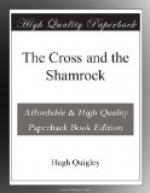In truth, the British poorhouse is a great government establishment, where the sons of the low squirearchy are provided for—a terrible mill, where the bodies and souls of Irishmen and women are ground up and annihilated—a labor-saving machine of political economy, introduced into the world by the robbers of the reformation, in order to get rid of surplus population, and in order that the Lazaruses of society might not disturb the false repose of their hypocrisy, by begging the crums that fall from their plunder-burdened tables!
The American poorhouse, however, is of quite a different description, and the promptitude and unanimity of the public mind regarding the necessity of a law to provide for the support of the poor are among the most laudable traits in the American character. In America, the patrimony of the poor was never wrested from the church, to which God committed their care; the charities and bequests of ages were not plundered and squandered by the vilest of the human race, as in Britain; hospitals, churches, abbeys, monasteries, convents, and other endowed provisions for the poor, were not robbed and confiscated by the sectarians of the new world, (probably because they did not exist there;) and hence the essential difference between the English and American poorhouse. There is no part of the Scripture the reformation people so rigidly adhered to, or now pretend to adhere to, as the advice of Judas, “Let this be sold and given to the poor.” They made the sale, but the poor they left unprovided for, till their numbers increased so as to threaten the ill-gotten goods of the plunderers, who at length passed laws compelling the poor to support the poor. And this was the origin of poorhouses—a true Protestant creation.
CHAPTER V.
THE O’CLERYS.
The O’Clery family was an ancient and honored one in Ireland. Princes, chieftains, and warriors of the name were renowned before Charlemagne or Alfred ascended the throne, or before any of the petty princes of the heptarchy ruled over the barbarous Saxons. Like all the royal and noble houses of Europe, the O’Clerys, after ages of glory and prosperity, had their hour of decline and decay also. But it was a question whether the virtues of this renowned house were more brilliant or conspicuous in the zenith of its glory, or in its fallen or humbled state. The Irish church founded by Saint Patrick never wanted




